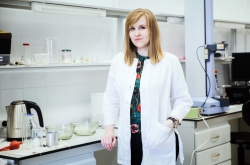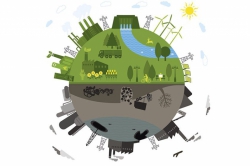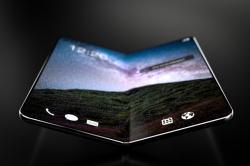Your internship at the University of Aveiro lasted for three months instead of six. Why did you come back earlier and what research projects did you work on?
Vladislav Slabov: It is true, the Erasmus+ program at the University of Aveiro for Master’s students is designed for six months, but we had to finish it earlier so that we could defend our theses. It is important to note, that we didn’t go there to study but to conduct our research. We worked in different laboratories. I was placed in Andrei Kholkin’s research group specializing in piezoelectric materials. These are materials that can transform an electrical signal into mechanical vibrations and vice versa. They are often used in various automated systems and sensors. During the internship, I studied new methods of working with piezoelectric materials. Apart from that, I collaborated with Professor Filipe Figueiredo on the process of diphenylalanine sorption (a physical and chemical process by which one substance becomes attached to another). I had worked with diphenylalanine before, but this time, I focused on its specific properties.
Kirill Keller: I worked in Professor Maria Rute Ferreira André’s research group which focuses on photonic hybrids and nanomaterials. During my internship, I studied the samples created in SCAMT laboratory, using two different devices. SCAMT laboratory doesn’t have such devices, but other Russian research centers do. Of course, I could just give these samples to them, but I wanted to learn how to work with such devices myself. That’s why I decided to take part in this internship.

Were there any other international students in your research groups? How did you communicate with them?
Vladislav Slabov: There were eight people working in my laboratory. Half of them spoke Russian, while others were from Portugal and India, so we used three languages when talking to each other: English, Russian and Portuguese. There was no such thing as a language barrier, as we could always switch to English.
Kirill Keller: The people in my laboratory were mostly Portuguese, and we communicated only in English, though they used their mother tongue when speaking to each other.

Did you have to present the results of your work?
Vladislav Slabov: As it was a research project, we didn’t have any credits; we just discussed the results of our projects with our supervisors instead. When the internship came to an end, we presented our research to our teachers and published a short article.
In your opinion, what is the main difference between the laboratory in Portugal and SCAMT laboratory?
Vladislav Slabov: There is no rush there. Here, in Russia, we have to achieve lots of results in a short period of time, while it’s much less intense in Portugal.
Kirill Keller: I think that people are much more carefree in Portugal. For example, if they are late, then it’s not by about 10-15 minutes, but an hour.
Was it hard to apply for the Program and get accepted?
Vladislav Slabov: No, it was fine. But I really recommend applying for a national visa, instead of a Schengen one which we applied for. The thing is, it takes less time to get a Schengen visa, but its duration is limited to 90 days, which may cause problems with scholarships.

Kirill Keller: Don’t worry that your scholarship won’t be enough. We were paid about 800 euros a month and they also covered our flights.
How did you interact with the representatives of Erasmus+?
Vladislav Slabov: The program is very well organized. They have offices in every European university participating in the program which can be of big help to students. For example, they can help you find an affordable cellular provider and such. Besides, they organize various team-building activities where you can make friends with other participants.
Kirill Keller: Make sure to write to the Erasmus+ office in advance, about a week before your arrival, and ask them to give you a “buddy”, a local student who has already taken part in internships and can share this experience with you. A “buddy” will help you to get around and find accommodation. Many elderly Portuguese don’t speak English, and if you don’t know Portuguese, a “buddy” will be your personal guide.
Aveiro is a small town. Are there many things to do there?
Vladislav Slabov: The town is called the "Little Venice": there is a tourist center, a cinema and some bars and cafés. It’s nice there, but not as exciting as in St. Petersburg.
Kirill Keller: But the food there is delicious. You can cook for yourself, and it will cost you about 50 euros a week. And you can buy everything you want. Don’t eat out as it can be very pricey.

What would be your advice to anyone who wants to go on an internship in Portugal?
Vladislav Slabov: Don’t forget to take some cash for the first month, as it takes about three or four weeks to get all the paperwork done, after which you will be allowed to open a bank account. It took about a month until the first money from Erasmus+ arrived. So you will have to pay for your flight and accommodation yourself. 800 euros will be enough for the first month. A room in Aveiro costs about 200 euros per month, but they usually ask you to pay twice the price when checking in. If you want to live in a student dormitory, make sure to book a room in advance.
Kirill Keller: Prepare for bureaucracy. Portuguese people can be very slow when it comes to paperwork. And there is nothing to do about it.
Vladislav Slabov: It’s very beautiful in Portugal. If you have a driving license, you can rent a car and travel. We had enough time for that. There are so many places around worth visiting.
Kirill Keller: There is a stereotype that Portugal is a very warm country. There was no heating and it was very cold in March. Summer is probably the best time to visit this country.
Few people know that if you are an Erasmus + Student, you can get a 15 % discount for Ryanair flights. The only condition is that you have to book your flight in a month. I used this discount during my trip to Italy.




